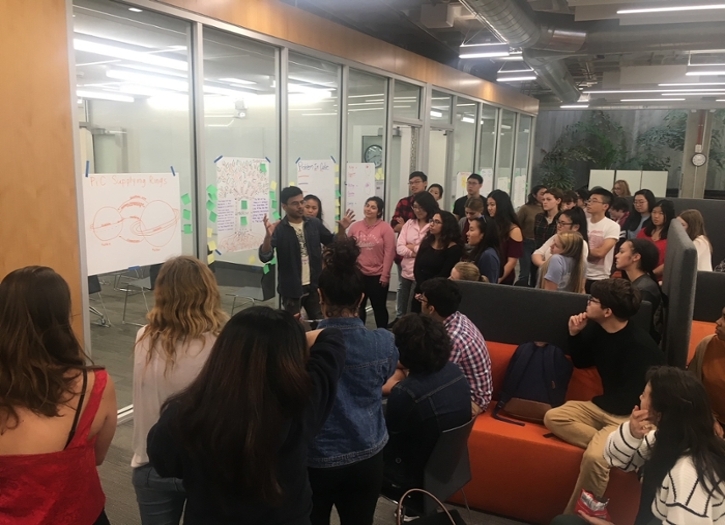Consultant Education + Training
Our ongoing consultant education program is interdisciplinary and dynamic. We believe that to best serve students, our Writing Consultants need a multi-faceted array of skills and knowledge, as well as the flexibility to adapt to a student's needs in real time during a consultation session. To ensure high quality services to students, all Writing Consultants must: 1) meet broad academic requirements for the position, 2) uphold and operationalize the Writing Hub Principles and Practices, and 3) participate in the Writing Consultant Education Program (WCEP).
The WCEP supports Writing Consultants’ professional, personal, and academic development through group instruction and collaboration, routine reading and research, reflection, observation and performance feedback, and individualized mentoring. The program encourages regular dialogue between Consultants and professional staff, and is updated each quarter to respond to the unique and timely needs of our campus.
Theoretical Basis and Guiding Scholarship
The WCEP emerges from an informed history of writing center scholarship surrounding tutor education and professional development. Specifically, the WCEP builds on scholarship that reveals the benefits of tutor education that is ongoing, based in contemporary research and theory, and complemented by hands-on practice and regular reflection. Whenever possible, elements of the WCEP are assessed and updated to best reflect current trends in the writing center community, in response to new research from relevant publications (e.g. The Writing Center Journal, The Peer Review, WLN, etc.) and guidance from professional organizations (e.g. International Writing Centers Association; Conference on College Composition and Communication, etc.). See the bottom of this page for a list of the core texts informing the theoretical and practical bases of the WCEP.

Undergraduate Consultant Education Objectives
The WCEP aims to help all Undergraduate Writing Consultants meet the following objectives:- Develop an advanced understanding of foundational writing knowledge and common challenges faced by student writers, both in sessions and in educational activities.
- Effectively identify critical writing issues in a variety of disciplines and genres, and collaboratively develop strategies and for clarity and revision.
- Cultivate ongoing awareness of the intersection of language, power, and privilege, with specific attention to how language is informed by histories of colonization and ongoing systems of white supremacy.
- Apply research-supported strategies for facilitating students' learning, self-efficacy, and long-term writing development through conversation and supportive questioning.
- Develop an understanding of the cognitive, social, and emotional nuances of writing and learning, and how these inform student experiences at UCSD and in the Writing Hub.
- Expand their repertoire of professional skills and behaviors, including interpersonal communication, critical thinking and problem-solving, time and project management, teamwork and collaboration, understanding social/global contexts, etc.
Graduate Consultant Education Objectives
The WCEP aims to help all Graduate Writing Consultants meet the following objectives:
- Develop awareness of the distinct conventions and practices of academic discourse in their home (and adjacent) disciplines/departments, and navigate the complexity of discipline-specific cultures of reseach and communication.
- Generate informed, interdisciplinary principles of academic composition through approaching texts as rhetorical situations informed by genre, audience, and purpose.
- Practice strategies and approaches for cultivating students' authorship, agency, and confidence to leverage their own perspectives and shape the academic conversations in their fields.
- Develop an advanced understanding of the role of writing (and writing support) within broader institutional contexts of graduate education, graduate persistence and attrition, academic and professional career pipelines, and educational equity and justice.
- Cultivate ongoing awareness of the intersection of language, power, and privilege, with specific attention to how language is informed by histories of colonization and ongoing systems of white supremacy.
- Apply research-supported strategies for facilitating graduate students' advanced academic writing knowledge, sustuainable writing practices, and long-term writing development.
Core Texts
Fitzgerald, L. & Ianetta, M. (2016). The Oxford Guide for Writing Tutors: Practice and Research. New York, NY: Oxford University Press.
Greenfield, L. & Rowan, K. (2011). Writing Centers and the New Racism: A Call for Sustainable Dialogue and Change. Logan, UT: Utah State University Press.
Grimm, N.M. (1999). Good Intentions: Writing Center Work for Postmodern Times. Portsmouth, NH: Heineman/Boynton-Cook.
Hall, R.M. (2018). Around the Texts of Writing Center Work: An Inquiry-Based Approach to Tutor Education. Logan, UT: Utah State University Press.
Johnson, K.G., & Roggenbuck, T. (Eds.). (2019). How We Teach Writing Tutors: A WLN Digital Edited Collection. https://wlnjournal.org/digitaleditedcollection1/index.html
Kamler, B. and Thomson, P. (2006). Helping Doctoral Students Write: Pedagogies for Supervision. London: Routledge.
Lawrence, S. and Myers Zawacki, T. (2018). Re/Writing the Center: Approaches to Supporting Graduate Students in the Writing Center. Louisville, CO: Utah State University Press.
Mackiewicz, J. & Thompson, I.K. (2015). Talk About Writing: The Tutoring Strategies of Experienced Writing Center Tutors. New York, NY: Routledge.
McAlpine, L. and C. Amundsen (2011). Doctoral Education: Research-Based Strategies for Doctoral Students, Supervisors, and Administrators. New York: Springer.
Portanova, P., Rifenburg, J. M., & Roen, D. (Eds.). (2017). Contemporaryy Perspectives on Cognition and Writing. Perspectives on Writing. The WAC Clearinghouse; University Press of Colorado. https://wac.colostate.edu/books/perspectives/cognition/
Rosenwasser, D. & Stephen, J. (2012). Writing Analytically (6th ed.). Boston, MA: Wadsworth/Cengage Learning.
